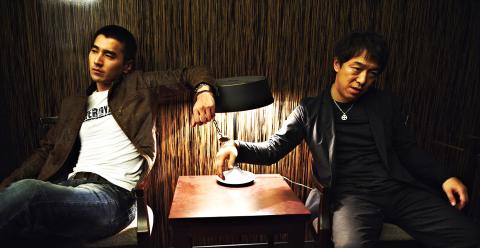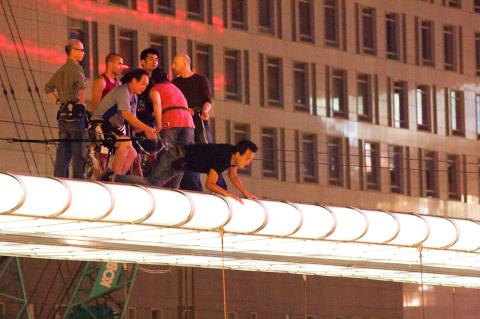A helicopter shootout, street explosions and a hijacked airplane — these are common elements in Hollywood action flicks, but they are rarely, if ever, attempted by Taiwanese cinema. That is, until now. An action blockbuster released for the Lunar New Year, Black and White Episode 1: The Dawn of Assault (痞子英雄首部曲:全面開戰) by Tsai Yueh-hsun (蔡岳勳) successfully turns up the heat with action sequences the like of which have never been seen in local productions. The fireworks are complemented by a star-studded cast led by Mark Chao (趙又廷) and China’s Huang Bo (黃渤).
There is already talk of a sequel as the current movie is billed as the prequel to Tsai’s popular TV drama Black and White (痞子英雄).
Set in a fictional metropolis named Harbor City, the movie begins with an illegal diamond deal gone wrong as small-time gangster Xu Dafu, played by Huang, finds there is more than one buyer salivating over his smuggled gems. A group of military men intercept the case of diamonds, killing everyone on the spot but Xu. He is rescued by Hero Wu, played by Chao, a young, upright police officer who believes there is no gray area in justice.

Photo courtesy of Universe Entertainment
It does not take long before the two are targeted and chased by rival hit men and militants.
The story unfolds when beautiful scientist Fan Ning (Angelababy, aka Yang Ying, 楊穎) comes along, explaining that the whole hullabaloo is not about the diamonds, but what else the case contains: an anti-matter bomb that could destroy humanity if it falls into the wrong hands.
The villains, in this case, are a militant group from Pawanda, a make-believe country in Southeast Asia, which is planning to set off the bomb in the city.

PhotoS courtesy of Universe Entertainment
Naturally, fingers are crossed that the unlikely duo will save the day.
Mostly shot in Kaohsiung with a hefty budget of NT$350 million, the movie is an ambitious project produced by a skilled crew of filmmakers.
The action choreography was created by French martial artist and actor Cyril Raffaelli, who works closely with Luc Besson, while a professional pyrotechnics studio from Hong Kong supervised the explosion scenes.

PhotoS courtesy of Universe Entertainment
Director Tsai and his team spent NT$30 million to have an aircraft mock-up made in the US. Now based in Kaoshiung, the plane is Taiwan’s first to be built specially for movies.
Needless to say, the resulting movie is packed with adrenaline-pumping action, all undertaken without stuntmen.
Chao is definitely an action star in the making. He jumps from a bridge, spins a car at high speed and drives through explosions.
There is a sparkling on-screen chemistry between Chao and Huang as the righteous cop and the smart-mouthed gangster. The two partners progress through finely choreographed set pieces that make good use of the diverse landscapes that the port city offers. From industrial docks, ultra modern skyscrapers to a bustling urban center, Kaohsiung looks like an amusement park for filmmakers, which will probably please the movie’s sponsor, the city’s government.
Though the action is top-notch, more often than not, the film prizes style over content.
The story and the motives of the characters are not properly outlined, and plot lines appear and disappear without sufficient exposition. As a result, the film gets a bit baffling toward the end as to what groups of characters are involved.
Nevertheless, director Tsai and his team deserve a round of applause for producing a slick Hollywood-style production.
Apart from Black and White Episode 1: The Dawn of Assault, the Lunar New Year season sees a slew of Taiwanese movies hitting the big screen to entertain the holiday crowds. Both Flying Dragon, Dancing Phoenix (龍飛鳳舞) [see Around Town, page 13] and Din Tao: Leader of the Parade (陣頭) focus on local culture in the form of gezai opera and temple fairs, respectively. Meanwhile, Bang Bang Formosa (寶島大爆走) and Perfect Two (新天生一對) by slapstick director Chu Yen-ping (朱延平) target people with a taste for farcical comedy. Finally, romance blossoms in The Soul of Bread (愛的麵包魂), starring rising star Michelle Chen (陳妍希), and Doze Niu’s (鈕承澤) star-studded Love (愛), will be released on Feb. 10.

June 9 to June 15 A photo of two men riding trendy high-wheel Penny-Farthing bicycles past a Qing Dynasty gate aptly captures the essence of Taipei in 1897 — a newly colonized city on the cusp of great change. The Japanese began making significant modifications to the cityscape in 1899, tearing down Qing-era structures, widening boulevards and installing Western-style infrastructure and buildings. The photographer, Minosuke Imamura, only spent a year in Taiwan as a cartographer for the governor-general’s office, but he left behind a treasure trove of 130 images showing life at the onset of Japanese rule, spanning July 1897 to

In an interview posted online by United Daily News (UDN) on May 26, current Chinese Nationalist Party (KMT) Chairman Eric Chu (朱立倫) was asked about Taichung Mayor Lu Shiow-yen (盧秀燕) replacing him as party chair. Though not yet officially running, by the customs of Taiwan politics, Lu has been signalling she is both running for party chair and to be the party’s 2028 presidential candidate. She told an international media outlet that she was considering a run. She also gave a speech in Keelung on national priorities and foreign affairs. For details, see the May 23 edition of this column,

The Taiwan People’s Party (TPP) on May 18 held a rally in Taichung to mark the anniversary of President William Lai’s (賴清德) inauguration on May 20. The title of the rally could be loosely translated to “May 18 recall fraudulent goods” (518退貨ㄌㄨㄚˋ!). Unlike in English, where the terms are the same, “recall” (退貨) in this context refers to product recalls due to damaged, defective or fraudulent merchandise, not the political recalls (罷免) currently dominating the headlines. I attended the rally to determine if the impression was correct that the TPP under party Chairman Huang Kuo-Chang (黃國昌) had little of a

At Computex 2025, Nvidia CEO Jensen Huang (黃仁勳) urged the government to subsidize AI. “All schools in Taiwan must integrate AI into their curricula,” he declared. A few months earlier, he said, “If I were a student today, I’d immediately start using tools like ChatGPT, Gemini Pro and Grok to learn, write and accelerate my thinking.” Huang sees the AI-bullet train leaving the station. And as one of its drivers, he’s worried about youth not getting on board — bad for their careers, and bad for his workforce. As a semiconductor supply-chain powerhouse and AI hub wannabe, Taiwan is seeing